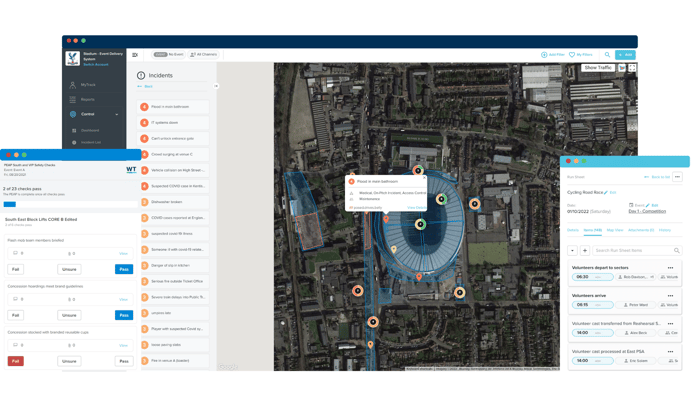Control rooms and incident responses already come under great scrutiny. With Martyn's Law and COVID-19, regulators and auditors will be more stringent in making sure that venue and event managers follow adequate preventative and restorative measures to ensure public wellbeing.
Following these steps will help you on site and also ensure that your operations stand up to any audit.
 Prepare thoroughly. Be prepared for things to go wrong - they always do! Identify common incident types and take learnings from one incident to the next by carrying out proper analysis after the fact. Make communication effective by fully involving contractors and departments with your team on-site, letting information flow unhindered between all affected parties.
Prepare thoroughly. Be prepared for things to go wrong - they always do! Identify common incident types and take learnings from one incident to the next by carrying out proper analysis after the fact. Make communication effective by fully involving contractors and departments with your team on-site, letting information flow unhindered between all affected parties.
Respond consistently. Have a plan for how to respond when things do go wrong. You need a playbook of contingency plans and checklists which align with the common incident types you have mapped out. Knowing that incidents cannot be closed until particular steps have been carried out and recorded enables you to later provide proof and audit logs.
Ensure accountability. Stay accountable by logging decisions, discussions and actions. Splitting out a general log from an incident list will allow a loggist to record everything they consider relevant, without adding extra noise to high priority items in the incident list. There needs to be a way of recording every update that is received from your team on the ground, every contingency action that has been carried out, and every decision made, with these logs time and date stamped, and impossible to delete.
 Thorough preparation, consistent incident response and post-event accountability will drive your event or venue's safety and security when the unexpected inevitably occurs.
Thorough preparation, consistent incident response and post-event accountability will drive your event or venue's safety and security when the unexpected inevitably occurs.

Incident Management: Information you need to keep your site secure on event day
Here we look at what you need to know to ensure effective and efficient incident management, with oversight across your event and venue.

- Mapping. Overlaying your control room operations onto a map application gives you great visibility over the status of your venue, and enables you to understand areas where incidents occur more frequently.
- An event log. It is also important to log items that are not incidents, giving you a time-stamped record of everything that happened on an event day. This gives you an audit trail and helps you analyse retrospectively.
- Dashboards. As important as having the right information is making sure that you have that information readily available at the right time.
- Reports. For a venue that delivers a number of events each year, reports are an essential way of taking stock at the end of each event day and assessing your status ahead of the next one.
- The right information. You should always consider permissions and confidentiality, particularly in incident management; certain incidents could damage your venue's reputation if they were public knowledge. Not every individual should or needs to know every piece of information.
- Information outside of your Control Room. Finally, it is always crucial to keep departments, contractors and other stakeholders in the loop with any information that they need. How will information be shared with these groups?

4 ways to adhere to Martyn's Law in your Incident Management
Here, we look at how effective incident management enables you to follow the advice of Martyn's Law and boost your event and venue security.
 Prepare your contingency plans. Have a contingency plan ready to go in case of a terrorist incident. Martyn's Law proposes Guide, Shelter, Communicate. Use this plan to brief your staff just before an event.
Prepare your contingency plans. Have a contingency plan ready to go in case of a terrorist incident. Martyn's Law proposes Guide, Shelter, Communicate. Use this plan to brief your staff just before an event.
Assign your incidents. Make sure you know who will lead on incident response if a terrorist incident does happen. Make sure your roster of staff includes some with counter-terrorism training.
Keep an audit trail. This will be crucial. You will need to show that you recorded and assigned a terrorist incident, what communication took place, the plan that was followed, and the responsible individuals.
Reassure stakeholders and learn lessons. Audit trails aren't just for audits! Make sure that people feel safe and confident when visiting your venue, and that you are constantly re-testing contingency plans to be sure they remain effective.


 Martyn's Law
Martyn's Law









